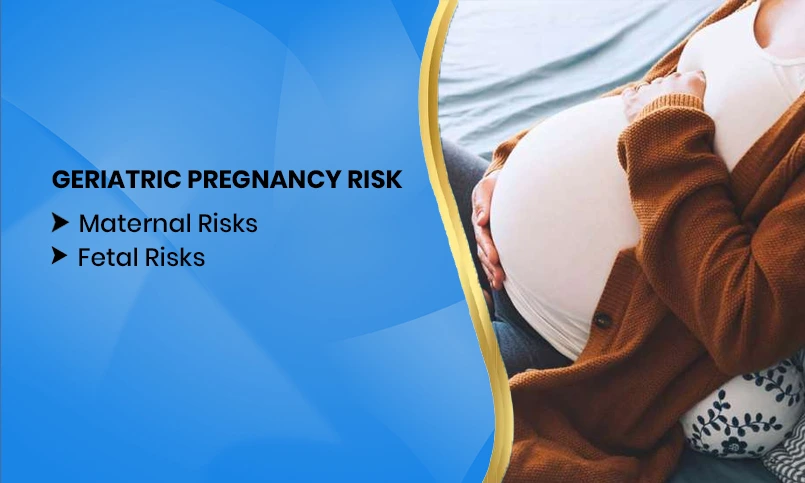The Geriatric pregnancy is a term commonly known as the advanced maternal age, which means a pregnancy that is conceived at the age of 35 years or older. In this type of pregnancy, the chances of miscarriages, genetic disorders and major pregnancy complications occur.
Earlier, in medical terms, the Geriatric pregnancy is termed for the pregnancy occurring in the person aged 35 or above. Nowadays, this term is officially known as advanced maternal age (AMA).
There are certain complications in late pregnancies, although many women and doctors have shared their successful stories. Additionally, pregnancies at the age of 35 or more can have several benefits too. Let’s understand the causes, benefits and problems with their solutions for this type of pregnancy.
The overall health of the mother affects the pregnancy phase during the late pregnancy because after the 30s the fertility rate of a woman declines due to low egg quantity and quality.
Major reasons of Geriatric Pregnancy
There are many reasons why women conceive late or prefer the late pregnancy. Some of the reasons are mentioned below:
- Many women feel the need to focus on their career and personal goals before conceiving or planning for a baby.
- Late pregnancies become a global trend.
- Due to advanced medical science such as IVF and more. Women generally feel inclined to opt for the late pregnancies.
Geriatric Pregnancy Risk

The risk of having a late pregnancy is linked to maternal, fetal, birth abnormalities and other major complications. Here are the detailed risk factors one can have in their geriatric pregnancy.
Maternal risks
The maternal risk factors of the delayed pregnancies are majorly related to the fetus and the mother. Risks such as
- Chances of getting pregnant are low.
- Multiple pregnancy are common in late pregnancies
- Gestational diabetes.
- Preeclampsia and hypertension.
- Increased risk of miscarriage
- Preterm labor or premature birth.
- Prolonged rupture of membranes.
- Cesarean delivery.
- Placental abruption is a condition when the placenta detached from the uterus before delivery. However, it is a rare condition but can occur in late pregnancies. And many other factors
Fetal risks
The fetal risks of geriatric pregnancies are generally related to the fetus, where the developing fetus experiences or has the following risk factors:
- Chromosomal abnormalities, including Down syndrome, congenital heart defects, genetic syndromes and more.
- Low birth weight: the weight of the fetus is turn out to be low mostly in the cases of late pregnancies which will result in still birth or other major issues.
- Fetal deaths and other
Mothers who conceive late may also experience emotional and physical stress factors due to many reasons, including society pressure, emotional unavailability and more.
In some of the rare cases, the late pregnancy develops an ectopic pregnancy, which means when the fertilized egg implants outside the uterus, the egg will not develop into the baby as it will not survive outside the uterus.
Geriatric Pregnancy Advantages
The late pregnancies not only come with risk factors; they also have certain advantages that will be beneficial for the women who choose Geriatric pregnancy. Advantages majorly revolve around financial stability and emotional strength for the person.
- Financial stability is the biggest benefit of late pregnancies, as it will help the parent prepare themselves for the financial support to the baby that covers the schooling, parenting, childcare expenses, hospital expenses and many more.
- The emotional stability of the women can help them cope with the challenges during the pregnancy and increase their ability to manage the upcoming conditions.
- With the increase in age, it is said that people are more focused on particular things, and that can be beneficial because it enhances focus on prenatal care due to increased awareness of risks and challenges and having a mature parenting perspective.
- With the enhanced medical science along with healthcare and technology support, women feel safe and confident to conceive even in their late ages.
Managing Geriatric Pregnancy
Women who wish to conceive late do not have to worry about their pregnancy because, with the support of healthcare advisors and new scientific technologies, the complication can easily be handled. The following are some of the suggested tips that will contribute to a healthy geriatric pregnancy.
- Preconception Planning: before conceiving the baby in late 30s or above, it is advised to consult the healthcare provider or the pregnancy counselor for the preconception advices. They will guide the necessary tests and adjustments in lifestyle that are necessary for having a healthy pregnancy. It is recommended to visit the doctor or the healthcare provider three months prior to conception. Also include genetic counseling.
- Healthy Lifestyle: Prioritize the health and healthy lifestyle habit if planning to get pregnant at the age of 35 or more.
Follow a balanced nutrition pregnancy diet; get enough prenatal vitamin supplements to cover as prescribed by the doctor; gain the right amount of weight; and avoid exposure to toxic substances such as alcohol, smoking, and more.
- Regular Monitoring: whether the pregnancy is a geriatric pregnancy or not, always follow up on the regular check-ups, ultrasounds, and screenings like non-invasive prenatal testing (NIPT), blood tests, tests for any disease, disorder, or condition and more.
- Exercise: exercising during pregnancy will help to manage emotional stability, enhance physical fitness, and manage stress. Yoga or light exercise that requires less weight or force is the ideal option to keep yourself fit and enhance the chances of a healthy and safe pregnancy. It will also manage the emotional or physical challenge that the body faces with time.
Medical Care and Monitoring
Medical care and frequent monitoring play an essential role in pregnancy to have a healthy pregnancy tips. Healthcare advisers manage the overall procedure and the challenges of the pregnancy phase.
- During the medical care sessions, make sure to have frequent prenatal visits to check whether the baby is doing well or not and if it is required to change or add any medicines.
- Follow the tests and screening test to check the overall health of the fetus and how the diet and other factors are affecting the baby. Although with the help of tests and screenings, you can easily detect the issue at the beginning level and stop any condition or disease. Such as amniocentesis or chorionic villus sampling (CVS), a test during the pregnancy phase to check whether the baby has any genetic or chromosomal condition or disorder.
- Nowadays, advanced medical science has enhanced the way of monitoring fetal development; from baby movement to their heart rate, everything can be monitored.
During the pregnancy, the mother should have the support of the family and friends and must take guidance from the midwives. If the pregnancy is a geriatric pregnancy, they should be more careful and notice every change to reduce the chances of risk and other challenges. With the help of all these steps and guidance, one can achieve a healthy pregnancy even at late pregnancy age.
FAQS
Is 37 too late to have a baby?
No, getting pregnant at the age of 37 is not too late, but it can have certain complications, as pregnancy after 30s is considered a high-risk pregnancy. However, one can deliver a healthy baby by changing their lifestyle and diet.
What are the risks of getting pregnant after 35?
There are various risk factors of getting pregnant after 35, but that is not a big concern with the advanced medical science and support. However, major risk factors are that chances of getting pregnant are low and multiple pregnancies, gestational diabetes, preeclampsia and hypertension, increased risk of miscarriage, and many more.
What is the safest age to have a baby?
The safest age to get pregnant or conceive a baby is late 20s and early 30s because during this age criteria the quality of the eggs is good, which will result in a healthy pregnancy and more benefits to the mother and the baby both.
Can I get pregnant at 37?
Yes, it is possible to get pregnant even at the age of 37, although it comes with many complications and risks because the fertility of the women declines from their 30s. If you are planning to get pregnant at the age of 35 or more, first take prenatal counseling and checkups to ensure the chances of a healthy pregnancy and the changes in lifestyle that are required.

